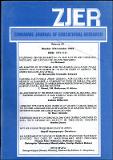| dc.contributor.author | Chidakwa, Cleopas Peter | |
| dc.contributor.author | Jonga, Wellington | |
| dc.contributor.author | Mandizvidza, Christopher Tafumaneyi | |
| dc.contributor.author | Makoni, Roselyn Dadirai | |
| dc.coverage.spatial | Zimbabwe | en |
| dc.date.accessioned | 2015-06-26T15:04:46Z | |
| dc.date.available | 2015-06-26T15:04:46Z | |
| dc.date.issued | 2009-11 | |
| dc.identifier.citation | Chidakwa, C. P. [et al ] (2009) An Assessment Of The Role Of Parents In Developing 'Fast-Track' Schools: The Case Of Mashonaland West Province, ZJER vol. 21, no. 3. (pp. 392- 401) UZ, Mt. Pleasant, Harare: HRRC. | en |
| dc.identifier.issn | 1013-3445 | |
| dc.identifier.uri | https://opendocs.ids.ac.uk/opendocs/handle/20.500.12413/6454 | |
| dc.description | A ZJER article on parents participation in the development of their local schools in rural Zimbabwe. | en |
| dc.description.abstract | The study focused on assessing the role that parents were playing in developing ‘fast-track’ schools in the newly resettled commercial farms under the fast-track Land Reform Programme in the Mashonaland West Province of Zimbabwe. Data were collected during focus group discussions and interviews with parents and on site observations of what was going on at the schools. A convenient sample of 58 newly-established primary schools was used for the study. This sample was chosen mainly because the schools were easily accessible to the researchers. The data collected were analyzed using content analysis. The study established that parents were instrumental in getting the schools established because they wanted their children to be able to access schools that were nearer their places of residence and to reduce the walking distances traveled by the children to and from school. Parents chose school sites that they considered central to where they lived and that had physical infrastructure that could easily be converted into classrooms. The contributions by parents included setting up school committees that assisted in mobilizing the parents to assist in the development and administration of the schools, supplying building materials and providing teaching and learning materials. The major challenges faced by parents included failure to provide adequate, decent housing, sanitary facilities, clean water, electricity, teaching and learning materials for use by teachers and pupils respectively. Parents also complained of the possible wastage of the limited resources they were investing in developingeducational facilities for their children when the schools they had developed were moved to more permanent sites. The researchers recommended that permanent sites for the schools be quickly identified and established. They also recommended that all stakeholders unite as equal partners in developing the.schools and that parents should pay realistic and meaningful levies needed to fuel development of conventional infrastructure in the schools. | en |
| dc.language.iso | en | en |
| dc.publisher | Human Resources Research Centre (HRRC); University of Zimbabwe (UZ). | en |
| dc.rights.uri | http://creativecommons.org/licenses/by-nc-nd/3.0/ | en |
| dc.subject | Education | en |
| dc.subject | Participation | en |
| dc.subject | Rural Development | en |
| dc.title | An Assessment Of The Role Of Parents In Developing 'Fast-Track' Schools: The Case Of Mashonaland West Province | en |
| dc.type | Article | en |
| dc.rights.holder | University of Zimbabwe | en |


